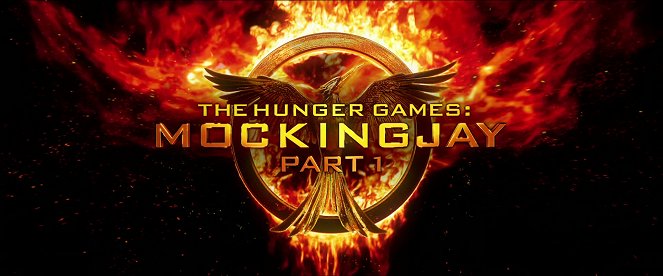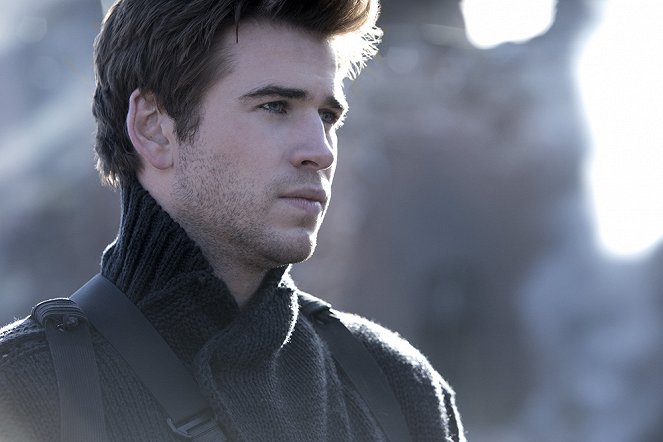Directed by:
Francis LawrenceCinematography:
Jo WillemsComposer:
James Newton HowardCast:
Jennifer Lawrence, Josh Hutcherson, Liam Hemsworth, Woody Harrelson, Elizabeth Banks, Julianne Moore, Philip Seymour Hoffman, Stanley Tucci (more)VOD (4)
Plots(1)
The worldwide phenomenon of The Hunger Games continues to set the world on fire with The Hunger Games: Mockingjay - Part 1, which finds Katniss Everdeen (Jennifer Lawrence) in District 13 after she literally shatters the games forever. Under the leadership of President Coin (Julianne Moore) and the advice of her trusted friends, Katniss spreads her wings as she fights to save Peeta (Josh Hutcherson) and a nation moved by her courage. (Lionsgate US)
(more)Videos (28)
Reviews (12)
The plot of the film was oddly compatible with the current situation on the Eastern Front. An evil ruler is trying to break the desperate but persistent resistance, with propaganda playing a crucial role. It makes no difference if it’s propaganda by the bad guys or the good ones. The way I see it, it's all about lies and manipulation. Plutarch Heavensbee not only showed skills that even Goebbels would have praised him for, but he also looked more likable. Natalie Dormer as Leni Riefenstahl was given much less space, but she pulled off her part very well. The film works excellently as a kind of anatomy of propaganda, but it’s not so great in other respects. Katniss Everdeen got post-traumatic stress syndrome as a bonus to all her amazing qualities, and since she was involved in the aforementioned propaganda, the character became almost insufferable for me, reciting speeches full of clichés and pathos with a face devoid of emotion, and saving the cat. Again, the writing avoided logic like a pedophile priest avoids celibacy. Well, it wasn't worth much, just as I’d suspected. / Lesson learned: Promote the only right ideas and maybe your face will be on posters. 2*-
()
Worse than the second film. Verbose, with very little action, and unnecessarily political. And there was all this fuss about it, even the new song by Lorde turned out to be unnecessary. It is incomprehensible how Jennifer Lawrence, compared to the excellently coherent and well-paced second installment, stumbled so badly and made a typically arrogant and tearful Hollywood shlock that lacks all the ingredients that made the second film a better one. A leap back to mediocrity with one single inventive moment – the chimney falling on the building.
()
I'm quite pleasantly surprised. The story of the protagonist in the service of propaganda - the revolution is perhaps unnecessarily intimate (the third installment of a very successful series and there is almost no sign from the decor that it had a blockbuster budget), but it cleverly and amusingly rotates the concept of the Games themselves, because although even this time the cameras are on full time and broadcast for crowds of people, it's a completely different broadcast with a completely different goal. But propaganda also works on the other side, and for a while it is (within the genre) a very decent psychological massage, although, of course, there is no doubt who the good guys and the evil guys are. I have to highlight the scenes with the singing and destruction of the dam, and also the liberation of the hostages, because Francis Lawrence filmed them excellently, they have atmosphere, they are thrilling... And I hope the entire next film will be like that.
()
“Order shall be restored.” The next to last instalment of The Hunger Games is perhaps not the most elegant example of Hollywood storytelling – in the end, the whole film is an unfulfilled promise of something tremendous – but in terms of media self-reflection, it offers enough impetus to keep you thinking for many days after seeing it. Haunted by nightmares, Katniss gains inner peace not by finding a kindred spirit and actively taking control of the situation, but by accepting the media role that has been created for her. Using dresses, computer effects and fighting words, she transforms into an effective tool of revolution, a player in an artificially constructed reality, which she herself gradually stops perceiving as something alien, separate from the real world. She gradually accepts her role and the vocabulary of her creators and adapts her behaviour to the (omni)present camera and the interests of the revolution (“Don't shoot here. I can't help them”). Her position as a mere symbolic object is clear from the situations in which she passively finds herself and from the way the other characters relate to her (even in her presence, they speak of her in the third person and are primarily concerned with making her look good in promotional videos). Playing on emotions, the narrative is tailored to her spontaneous decisions, essentially making it impossible for her to exit the story. What she doesn’t realise is that her story mirrors that of Peeta, that she herself has become a cat dully chasing the light (perhaps a needlessly conspicuous metaphor, but also a quite clear indication that it is a mistake to approach the film as a standard genre flick). The making of the rebel and the selling of the revolution happens in parallel on two levels (in-text and outside of the text) and it’s as if the film gives us a look behind the scenes of its own creation. After a gripping action scene in an otherwise unusually unspectacular, slow and disturbingly quiet film, the same shots of the attack on the rebel hospital are repositioned in the context of a propagandistic “weekly” whose purpose is to manipulate the masses, just as we were manipulated (captivated by the spectacle) a moment before. The camera “journalistically” follows Katniss even in scenes where she is not filmed in the diegetic space. The blending of shooting styles leads to the further blurring of the line between propaganda for the people of Panem and for us. We can thus see the film’s ending, warning against the authentic with the artificially produced television broadcast intended to cover up what is happening in reality in the meantime, as the ultimate act of insincerity perpetrated by an industry built on a similar distortion of reality, or accept it as an ingenious rebellion carried out within the confines of a major-studio Hollywood narrative. However, the filmmakers could not have taken the liberty of launching a rebellion if it didn’t involve an adaptation of a bestseller capitalising on the demand for stories of defiance against the old order and whose multimillion-dollar box-office receipts are guaranteed in advance. 80%
()
(less)
(more)
The first Mockingjay is one of the most typical blockbusters in the history of Hollywood. The second most commercially successful film in the Unites States in 2014 and the fifth in the given year in worldwide box-office revenues is completely devoid of money shots, epic scenes and bombastic action sequences. Its two-hour runtime predominantly comprises dialogue scenes, as most of the film takes place in an underground bunker and all of the characters wear baggy coveralls. Here the filmmakers can afford to do what would be commercial suicide anywhere else thanks to the fact that this is a feature-length exposition for the climax, which will come in the second film. The knowledge that, thanks to its title, the film will automatically be a hit regardless of what happens in it gave rise to the film saga’s crucial episode. Instead of a seasonal spectacle, we have here a film that appeals exclusively to adolescent audiences, but instead of the formulaicness and superficiality that is associated with this target group on the part of overly clever old people and pragmatic producers, it relates a narrative from an Orwellian grey world that uncovers deceit and media manipulation, showing the heroine fumbling her way between her own interests and the intentions of others, while offering no resolution of the conflicts that have arisen.
()



Ads